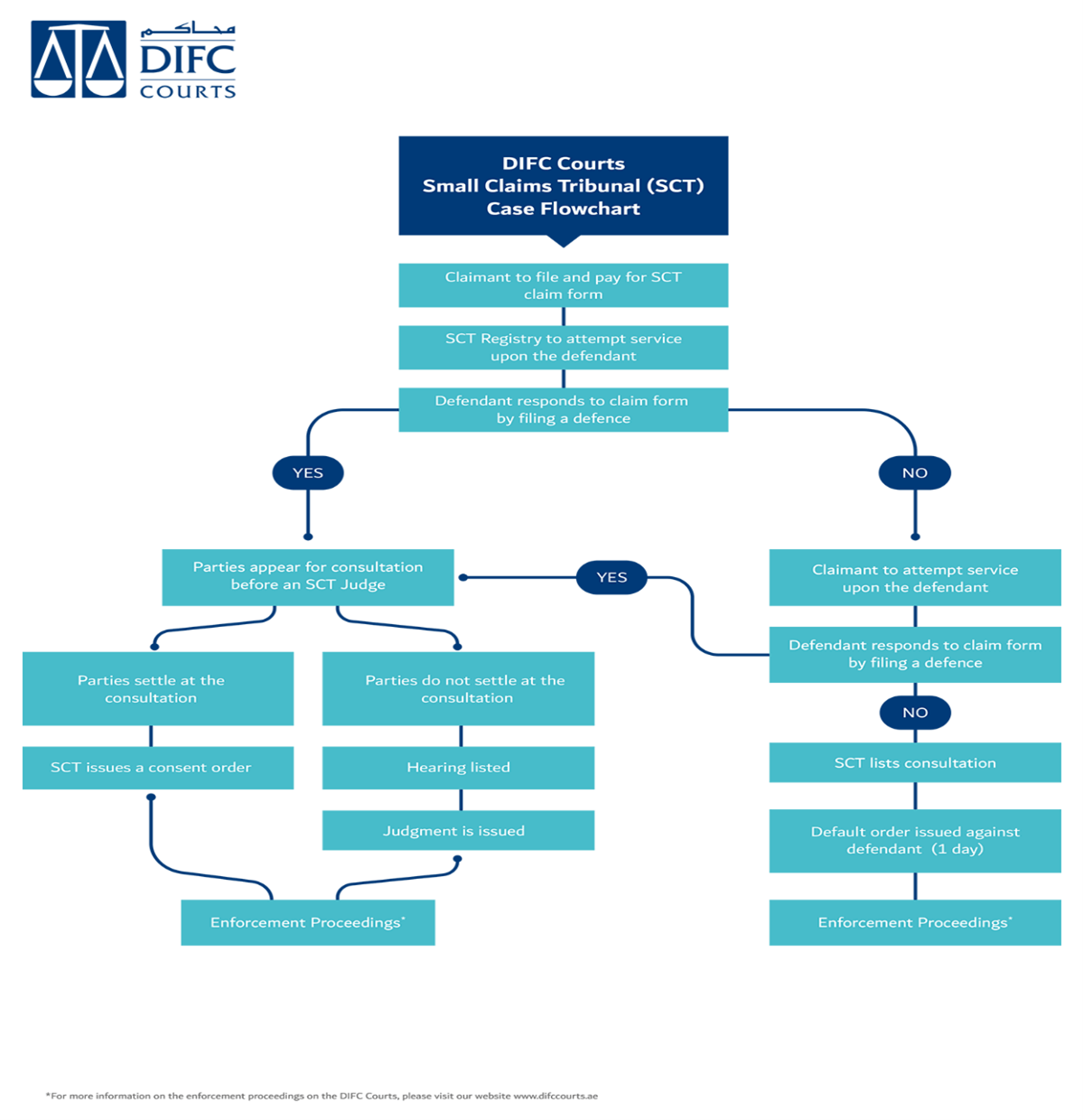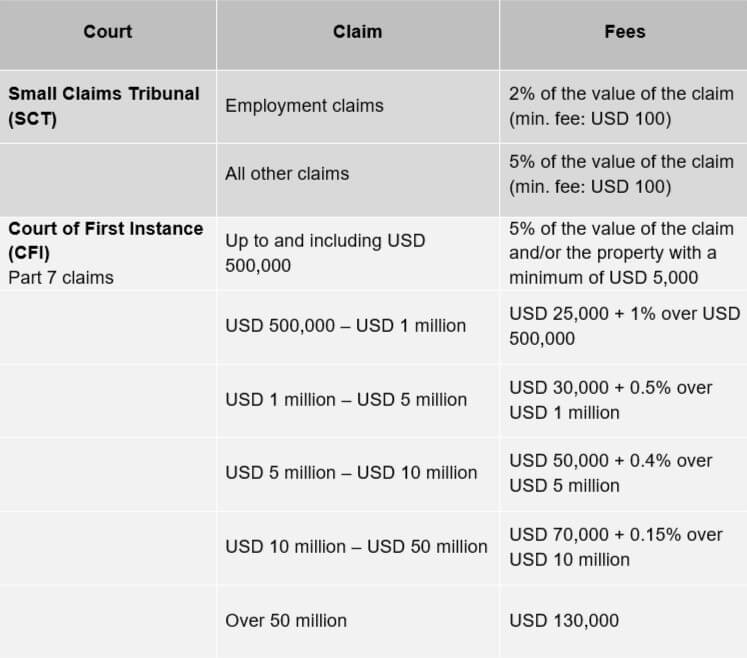Dubai, UAE | 09 August 2023
Key Takeaways:
- Dubai International Financial Centre (DIFC) stands out as a unique financial and legal hub in Dubai with its own distinct set of laws and rules.
- It is grounded in English legal principles, offering certainty and familiarity to those from common law backgrounds.
- DIFC courts hear cases regarding events occurring within the DIFC, and cases where the parties agree to DIFC’s jurisdiction, regardless of the location or subject matter of the dispute.
- For small claims, DIFC courts offer a quick resolution process where lawyers may not be needed.
- There is an emphasis on pursuing amicable settlements before initiating litigation.
- DIFC courts embrace technology in proceedings and allow for virtual hearings.
- Judgments issued by the DIFC courts can be enforced locally and internationally.
1. Understanding DIFC
DIFC is a financial free zone centrally located in Dubai, serving as a global financial hub for the Middle East, Africa, and South Asia markets.
Apart from its financial significance, DIFC has an independent legal system and courts, separate from the broader UAE judicial and legal framework.
DIFC courts manage civil and commercial disputes arising within or relating to the DIFC, as well as other disputes where the parties agree to use DIFC courts, regardless of where the dispute took place or what it is about – these are known as opt-in cases.
Notably, in the first six months of 2023, the opt-in cases represented 52.5% of the claims in the Court of First Instance, involving a wide range of business sectors, including banking & finance, real estate, construction, manufacturing, retail, hospitality and maritime. During the same period, DIFC Courts have reported AED 15 billion in claims value, reflecting a surge in the overall value of claims.
2. The Common Law Influence
DIFC is rooted in English common law, influencing its legal framework and practices, and providing certainty and a sense of familiarity to those from common law backgrounds. For businesses, this means more clarity in transactions and fewer ambiguities, especially when dealing with international partners and working on cross-border transactions.
In contract disputes, DIFC courts apply the law governing the contract in question. This means that the parties can choose the governing law of the contract, which the DIFC courts will then apply. For example, if the parties have agreed that their contract will be governed by the law of France, the DIFC Courts will apply French law. If the parties have not chosen any law to govern their contract, or if the dispute is not related to a contract, DIFC Courts will apply the DIFC’s own laws.
The judges of the DIFC courts are highly respected and qualified, coming from various common law jurisdictions, including England, New Zealand, Singapore, Hong Kong and Australia. Judges are nominated by the Judicial Appointments Committee, chaired by the Chief Justice of the DIFC Courts, and appointed by the Ruler of Dubai.
3. Pre-action Considerations
Before starting court proceedings, it is advisable to consider carefully the potential legal and commercial implications. It is crucial to keep in mind your ultimate desired outcome and if going through with the case is worth it. For example, sometimes winning a case may not be in the business’s best interest if it leads to reputational damage, waste of resources or cutting business ties with the other party.
This is when it may be important to consult a lawyer who can review and assess the case and provide their opinion on your legal position and potential case outcome. The lawyer’s key role at this stage is to advise the claimant (the person filing the claim) on whether they have a valid case, and the defendant (the person being sued) on whether to settle or fight in court.
In DIFC courts, parties often exchange written communications regarding the dispute before starting court proceedings. While this is not mandatory, it is advisable to exchange pre-action letters to stay in good standing when the court decides on how to allocate claim costs. The court takes into consideration the parties’ actions taken before and during the court proceedings, and accordingly, any reasonable effort by a party to settle is viewed favourably by the court.
4. The Small Claims Tribunal (SCT)
SCT offers a unique system to resolve cases efficiently and quickly (typically within four weeks after filing), while allowing parties to represent themselves without lawyers.
SCT handles claims under a specific threshold (AED 500,000, or AED 1 million with mutual agreement), as well as employment claims with no value limit if all parties to the claim elect in writing for it to be heard by the SCT. In practice, most disputes seen at the SCT are connected to small business transactions, employment issues, and tenancy matters.
Before moving forward with the case, an SCT judge (in their capacity as a mediator) holds a consultation meeting with the parties in order to attempt to settle the dispute. If the parties reach a settlement, the SCT will issue a Consent Order reflecting the agreement, which is treated as a final and binding judgment.
If the dispute is not settled during the consultation meeting, the SCT will schedule a hearing before a judge. SCT proceedings are typically held privately, leveraging electronic mediums such as video conferencing.
Lastly, SCT judgments are final and binding, enabling enforcement both within and outside the DIFC. There is however a limited right of appeal from the SCT to the Court of Frist Instance, based on points of law only (not on facts or evidence).

- High-Value Claims
Cases that do not fall under the SCT threshold or criteria are generally brought to the Court of First Instance (CFI). The CFI mainly deals with substantial civil and commercial disputes, through its four divisions: Civil & Commercial, Technology & Construction, Arbitration, and Digital Economy.
Discontent parties can appeal the CFI decision to the Court of Appeal based on points of law and/or procedural irregularities. If the party’s permission to appeal is approved, typically, a panel of three judges reviews the CFI decision and issues a final judgment on the matter.
6. Accessibility and Digitalisation
DIFC adopts modern and accessible systems, enabling many proceedings, especially within the SCT, to be conducted electronically. With DIFC’s e-Registry and e-Bundling systems, the courts’ users can execute most proceedings online, such as filing claims, sharing and accessing case documents, making fee payments, and accessing real-time case updates. Users can also easily access online court forms, rules, judgments, and other relevant resources.
7. Court Fees
Court fees are calculated based on several factors, most importantly, the type and value of the claim. The fees are precisely listed in the “DIFC Courts Schedule of Fees 2023” document, available on the DIFC courts’ website. The following table shows the fees for the claims in the SCT and CFI, as of the date of publishing this guide:

The fees are generally payable in advance by the party requesting or initiating the service or procedure, unless otherwise ordered by the court. A claimant accordingly would be requested to pay the fees for filing a claim at the time of filing, unless the fees are waived or reduced by the Registrar or a judge in cases of financial hardship, public interest, exceptional circumstances, or any other reason that they consider appropriate.
The successful party may recover the court fees and legal costs (lawyer’s fees) they incurred from the unsuccessful party, subject to the discretion of the court, depending on the circumstances of the case and the conduct of the parties. This is contrary to the standard approach in UAE onshore courts (e.g., Dubai courts), where the court typically grants the successful party the court and expert fees only.
8. Enforcement of DIFC Judgments
DIFC court judgments hold credibility and are enforceable both locally and internationally. DIFC judgments are enforced within the UAE in the same way as the judgments of the Dubai courts. Internationally, DIFC courts have made arrangements with various foreign courts, such as the English Commercial Court, to facilitate mutual recognition and enforcement of judgments. DIFC judgments are also enforceable through the relevant treaties between the UAE and the target country, such as the GCC Convention and Riyadh Convention.
Sources:
- https://www.difccourts.ae/
- https://www.difccourts.ae/media-centre/newsroom/difc-courts-sets-new-record-aed-15-billion-claims-value-first-six-months-2023
- https://www.difccourts.ae/wp-content/uploads/2018/01/ENFORCEMENT-GUIDE-2016-AW.pdf
- https://www.difccourts.ae/application/files/3016/8439/7359/DIFC_Courts_Schedule_of_Fees_2023.pdf
- https://www.difccourts.ae/difc-courts/services/small-claims-tribunal
For any questions or inquiries, please feel free to contact: